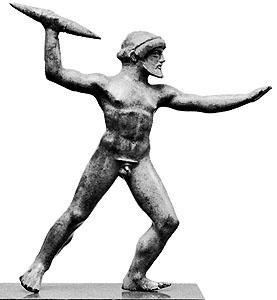
Fire: Religion and Philosophy

The importance of fire to man may be demonstrated by the numerous occurrences
of fire in mythology and religion as a divine entity or force. According
to Greek legend Zeus, having been deceived by Prometheus into only accepting
the bones of animal sacrifice, denies man the use of fire. Prometheus steals
fire from Hephaestus to save humanity. In retribution Zeus binds Prometheus
to Mount Caucasus where an eagle perpetually gorges on Prometheus' liver
by day, whilst the liver regenerates by night. It was to counterbalance
the gift of fire that Zeus created Pandora and gave her a box filled with
all the evils of the world.
In ancient Vedic scriptures the fire-god Agni is the messenger between
people and their gods and is personified as the sacrificial flame. The
Romans, Greeks and Zoroastrians (from Persia) maintained sacred fires.
The Incas and the Aztecs worshiped fire-gods. The Sun was believed to be
directly linked to fire; the Incas would ignite their sacred flames with
the Sun's rays. The Aztecs believed that the Sun and the Moon were the
result of their gods' sacrifice to a vast fire; two of them, Nanahuatzin,
a small deity covered with ulcers, and Tecciztécatl threw themselves
into the flames, from which the former emerged as the sun and the latter
as the moon. Then the Sun refused to move unless the other gods gave him
their blood and they were compelled to sacrifice themselves to feed the
Sun.
The great Greek scientists and philosophers also believed fire to be
of high significance. Aristotle declared fire, along with water, earth,
and air, to be one of the four general and essential elements of life and
of all things. Plato proposed that God used the four elements to create
the world. Heraclitus classified fire as the essential force of creation.